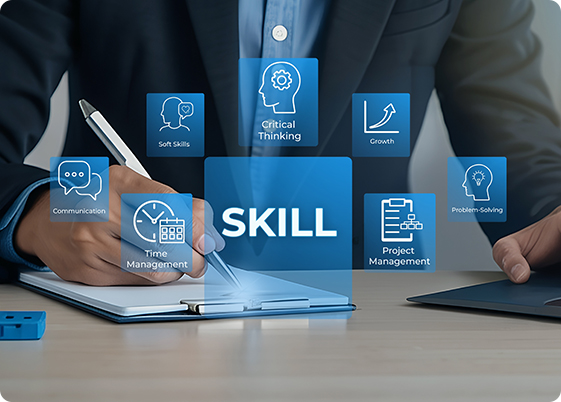
The world of work is changing at an unprecedented pace. From automation and AI to globalization and shifting consumer expectations, workers today need to be adaptable, skilled, and active in managing their careers.
Simply having an academic qualification or technical skills is not enough in today’s work environment. Employers are looking for individuals who are continuously updating their professional development skills so they can stay relevant.
This guide will outline the top 10 professional skills that will help you move from simply surviving to thriving in the world of work.
Whether you want to move up in your career, are looking to move to a different industry, or are considering opportunities such as BPO jobs or a move into a leadership role, acquiring these skills will ensure you stay competitive.
Best Professional Development Skills to Secure Your Career Future
Here’s a closer look at the list of professional development skills that will future-proof your career.
Adaptability and Flexibility
In today’s workplace, change is constant, whether it’s new technologies, company restructuring, or evolving customer needs. Professionals who can adapt and remain flexible are better positioned to succeed.
Why it matters:
- Keeps you relevant in shifting industries.
- Helps you embrace challenges instead of resisting them.
- Makes you valuable to employers looking for resilience.
How to improve my professional skills in adaptability:
- Volunteer for cross-functional projects.
- Embrace new tools or processes rather than avoiding them.
- Develop a positive mindset toward change.
Emotional Intelligence (EQ)
Emotional intelligence is the ability to understand, manage, and express emotions while building strong relationships with others. It’s one of the most critical soft skills professional development areas for long-term success.
Why it matters:
- Enhances collaboration and teamwork.
- Helps in conflict resolution.
- Builds leadership credibility
How to build EQ:
- Practice active listening.
- Empathise with colleagues and clients.
- Request feedback on how your actions affect others.

Critical Thinking and Problem Solving
Employers value professionals who can think critically and solve problems without relying on constant supervision. These skills development professionals are key to innovation.
Why it matters:
- Helps in decision-making under pressure
- Improves efficiency in resolving workplace challenges.
- Encourages creative solutions that drive business growth.
How to develop this skill:
- Break complex problems into smaller parts.
- Evaluate issues from multiple perspectives.
- Use data and evidence to inform your decisions.
Digital Literacy and Technical Proficiency
Digital literacy is no longer optional—it’s essential. Whether you’re handling customer queries, managing data, or leading projects, technical proficiency is a must-have professional skill.
Why it matters:
- Increases productivity by using digital tools effectively.
- Keeps you competitive in industries shaped by technology.
- Prepares you for automation and AI-driven roles.
How to improve:
- Take online courses on emerging tools.
- Stay updated with industry software.
- Explore automation to simplify repetitive tasks.

Project Management Skills
From small assignments to large-scale projects, the ability to manage time, resources, and people effectively is a vital professional development skill.
Why it matters:
- Ensures projects are delivered on time and within budget.
- Demonstrates leadership and accountability.
- Improves team coordination.
How to build project management skills:
- Learn to use tools like Trello, Asana, or MS Project.
- Set clear goals and milestones.
- Develop risk management strategies.
Communication Skills
Strong communication remains the foundation of professional success. Whether it’s written, verbal, or non-verbal, communication skills professional development is crucial in every role.
Why it matters:
- Enhances collaboration across teams.
- Improves customer interactions and presentations.
- Builds professional credibility.
How to improve:
- Practise concise and clear writing.
- Develop public speaking confidence.
- Learn to tailor communication to different audiences.
For example, professionals looking to build a career in customer service must refine both verbal and listening skills to deliver exceptional client experiences.

Leadership and Management Skills
Even if you’re not in a managerial position, demonstrating professional leadership skills can set you apart. Leadership is about influence, not just authority.
Why it matters:
- Inspires and motivates teams.
- Prepares you for future promotions.
- Builds trust and accountability.
How to develop leadership skills:
- Take initiative in team projects.
- Mentor junior colleagues.
- Practice decision-making and conflict resolution.
Networking and Relationship Building
Professional growth doesn’t happen in isolation. Building a strong network helps you unlock opportunities, learn from others, and stay informed about industry trends.
Why it matters:
- Expands your access to new opportunities.
- Strengthens your professional reputation.
- Provides support during career transitions.
How to develop this skill:
- Attend industry events or webinars.
- Connect with peers on LinkedIn.
- Cultivate genuine, long-term professional relationships.

Time Management
Among the most essential professional skills examples, time management is about balancing priorities, meeting deadlines, and staying productive without burning out.
Why it matters:
- Improves efficiency and reduces stress.
- Helps balance work-life commitments.
- Increases overall job satisfaction.
Time management professional development tips:
- Use productivity techniques like Pomodoro or time-blocking.
- Set SMART goals to prioritise tasks.
- Avoid multitasking—focus on one task at a time.
Strong time management is especially critical in high-demand roles such as customer service representative key skills, where managing multiple calls, queries, and deadlines is routine.
Conclusion
Future-proofing your career requires more than technical know-how—it demands a mix of adaptability, communication, digital expertise, and leadership. By investing in these professional development skills, you’ll remain competitive and prepared for shifts in the global job market.
Whether you’re pursuing opportunities in BPO jobs, strengthening your customer service representative key skills, or aiming to build a career in customer service, these top 10 skills will ensure long-term career resilience.
Start small—pick one or two skills to develop professionally, practice them consistently, and you’ll see a steady transformation in your professional journey.
Frequently Asked Questions (FAQs)
How can I develop a growth mindset for professional success?
Embrace challenges, view failures as learning opportunities, and focus on continuous learning to build resilience and adaptability.
What are the best ways to stay updated with industry trends?
Follow thought leaders, attend webinars, join professional associations, and regularly read industry publications.
How can self-motivation enhance my professional growth?
Self-motivation drives consistency, helps you push through challenges, and ensures you remain committed to long-term goals.
What are the benefits of mentoring in career development?
Mentors provide guidance, share experiences, and open doors to opportunities, accelerating your skill-building and confidence.
 Colombia
Colombia Canada
Canada India
India Jamaica
Jamaica Philippines
Philippines UK
UK US
US SA
SA
